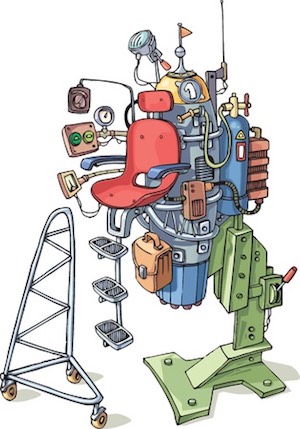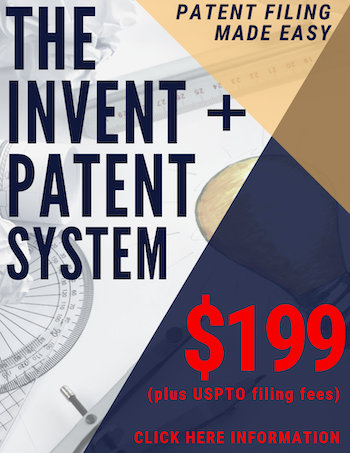 Sometimes inventors get so caught up in the creation aspect of inventing that they fail to stop and ask whether they should be investing the time, money and energy into the creation.
Sometimes inventors get so caught up in the creation aspect of inventing that they fail to stop and ask whether they should be investing the time, money and energy into the creation.
For example, take the extreme case to the left, which is a fictional illustration of a rather strage personal aircraft having a jet engine. The fact that such a device could be built is no doubt quite impressive, but is this the type of thing an inventor should be investing time, money and energy into creating?
The key to making money with innovation is to be able to solve a problem that will lead to a product or service that others will be willing to pay for. If consumers will not be willing to pay for what you invent then you probably want to move on to the next idea and let it mature into your next invention. After all, you will not only have to get consumers to pay for your product or service, but they will need to be willing to pay a premium to make it worthwhile given you will undoubtedly be investing some money into the creation of the invention, as well as into getting a patent to protect your rights.
I always encourage inventors to learn lessons from great inventors, and who better to learn from than Thomas Edison. Edison famously learned early in his career, inventing for the sake of inventing is not something that will lead to riches. After one of Edison’s first inventions was a flop he famously vowed to never again invent anything without first researching and determining that there would be a demand for the invention or innovation.
While science and innovation for the sake of obtaining knowledge is something that we as a society should to invest in, independent inventors simply cannot afford to engage in intellectual pursuits that have little or no likelihood of ever maturing into a commercialized product or service. University laboratories is where where science for the sake of science should go on, not in the garages of inventors trying to create revenue.
 The moral of the story is that the best innovation can lead to no financial reward, while sometimes modest improvements can lead to financial riches. Inventing is a strange thing that way. You never know what will actually make money until you enter the marketplace, but in order to preserve as much capital as possible and continue inventing you need to make sure you do not burn up all financial resources chasing an innovation that will not likely be a winner in the market even if successful.
The moral of the story is that the best innovation can lead to no financial reward, while sometimes modest improvements can lead to financial riches. Inventing is a strange thing that way. You never know what will actually make money until you enter the marketplace, but in order to preserve as much capital as possible and continue inventing you need to make sure you do not burn up all financial resources chasing an innovation that will not likely be a winner in the market even if successful.
Inventing is hard enough as it is. Don’t make it more difficult by adding an unnecessary layer of buisness complications. Do market research to satisfy yourself that there will be a demand for what you are inventing. And remember, while you can start out asking friends and family, that cannot be your only research. All to frequently friends and family will tell you what they think you want to hear rather than give you their honest opinions. So when your spouse or best friend says they think it is a great innovation make sure they are not just trying to save your feelings.
If you are serious about realistically estimating the size of the potential market for your invention I strongly recommend you read Plausibly estimating the market for your invention.
Good luck… and happy inventing!
For more information on this and related topics please see:
- Patent Basics: Practice Tips for Achieving Success in Inter Partes Reviews
- An Alternative to Claim Mirroring in Initial Patent Application Filing
- IP Goes Pop! You Can’t Do That – What IP Cannot Protect
- How to Use the USPTO Patent Public Search Tool
- Using Analytics to Assess the Effectiveness of Common Patent Prosecution Practices
- Tips from a Former Examiner on How to Conduct Interviews at the USPTO
- Ten Mistakes to Avoid When Drafting Information Disclosure Statements
- Defanging Descriptive Material Rejections
- Can You Refile a Provisional Patent Application?
- Ten Common Patent Claim Drafting Mistakes to Avoid
- It’s All in the Hardware: Overcoming 101 Rejections in Computer Networking Technology Classes
- Disclosure Requirements in Software Patents: Avoiding Indefiniteness
- Patent Procurement and Strategy for Business Success Part III: Prosecution – Wielding an Invisible Hand
- Patent Procurement and Strategy for Business Success Part II: Claims – Targeting the Right Infringers
- Patent Procurement and Strategy for Business Success: Building and Strategically Using Patents that Target the Right Infringers and Thwart Competitive Countermeasures
- Fit to Drive: Three Inspiring Office Action Responses from the USPTO’s Art Unit 3668
- Design Patents 101: Understanding Utility Patents’ Lesser-Known Cousin
- Two Key Steps to Overcome Rejections Received on PCT Drawings
- Errors in Issued Patents as a Measure of Patent Quality
- Intellectual Property for Startups: Building a Toolkit to Protect Your Products and Design
- Why the Patent Classification System Needs an Update
- Understanding What a Design Patent is Not
- Design Patents: Under Utilized and Overlooked
- Deciding Where to Obtain International Patent Rights
- When to Use the Patent Cooperation Treaty—and Why It’s So Popular
- Why and When Design Patents are Useful
- PCT Basics: Obtaining Patent Rights Around the World
- ipAwarenessAssessment: Inventors and Business Owners Should Start Their IP Journey with this USPTO-NIST Tool
- Successful After Final Petitions Can Help Advance Prosecution (Part V)
- From Agent to Examiner and Back Again: Practical Lessons Learned from Inside the USPTO
- WIPO’s INSPIRE Offers a New Way to Select Databases for Patent Searches Involving Machine Translations
- Understand Your Utility Patent Application Drawings
- Why It’s Time to Board the PCT Train: The Benefits of Filing U.S. Patent Applications via the PCT First
- Implications of Filing Subsequent Patent Applications in the United States (Part III)
- Types of Subsequent Patent Applications in the United States (Part II)
- Getting a Patent: The Devastating Consequences of Not Naming All Inventors
- Getting A Patent: Who Should be Named as An Inventor?
- Make Your Disclosures Meaningful: A Plea for Clarity in Patent Drafting
- Applying for a Patent in Germany
- Autopilot or Advocate? Raising the Bar in Ex Parte Appeals at the USPTO
- Time to ‘Think PCT’: Rethink Your Global Patent Strategy to Preserve Your Seat at the Table
- Patent Office Insights from Two Former Examiners
- Conventional Patent Wisdom Revisited
- Develop Your Database of Templates for Responding to Office Actions
- Background Pitfalls When Drafting a Patent Application
- Eight Tips to Get Your Patent Approved at the EPO
- Four Things C-Suite Executives Need to Know About Patents
- Starting the Patent Process on a Limited Budget
- What to Know About Drafting Patent Claims
- Beyond the Slice and Dice: Turning Your Idea into an Invention

![[IPWatchdog Logo]](https://ipwatchdog.com/wp-content/themes/IPWatchdog%20-%202023/assets/images/temp/logo-small@2x.png)

![[[Advertisement]]](https://ipwatchdog.com/wp-content/uploads/2018/10/ip-ad_rocket_464.jpeg)
![[Advertisement]](https://ipwatchdog.com/wp-content/uploads/2024/04/UnitedLex-May-2-2024-sidebar-700x500-1.jpg)
![[Advertisement]](https://ipwatchdog.com/wp-content/uploads/2024/04/Artificial-Intelligence-2024-REPLAY-sidebar-700x500-corrected.jpg)
![[Advertisement]](https://ipwatchdog.com/wp-content/uploads/2024/04/Patent-Litigation-Masters-2024-sidebar-700x500-1.jpg)

![[Advertisement]](https://ipwatchdog.com/wp-content/uploads/2021/12/WEBINAR-336-x-280-px.png)
![[Advertisement]](https://ipwatchdog.com/wp-content/uploads/2021/12/2021-Patent-Practice-on-Demand-recorded-Feb-2021-336-x-280.jpg)
![[Advertisement]](https://ipwatchdog.com/wp-content/uploads/2021/12/Ad-4-The-Invent-Patent-System™.png)






Join the Discussion
One comment so far.
Benny
August 7, 2016 05:31 amGene,
Prophesy is given to fools (ancient biblical saying). During the term of a patent a technological innovation can go from lab gimmick to market leader due to improvements in parallel technology, or could be completely eclipsed by a different, better solution. In some cases, filing a patent application is akin to buying a lottery ticket – could be a waste of money, could be a big time winner.
On the other hand, in a few cases I’ve seen fanciful, impractical patent applications from the past serve as prior art preventing commercial manufacturers from obtaining broad patent claims. Whether that is a positive or negative effect depends on your point of view.